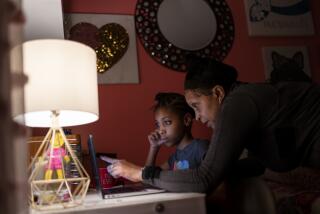When Learning Clicks
- Share via
Wooed by the promise of e-mail access and endless research opportunities for the kids, you’ve signed up for an Internet account. But how do you make sure that the budding reader of the house doesn’t log in, click on and space out?
Can cruising the Internet actually nurture reading skills? Or does the more random, visual-driven medium only shorten kids’ attention spans?
It all depends on how you use the technology, Internet experts and educators agree.
Simply letting children browse the World Wide Web, rather than reading to them each day, won’t cut it, said William Habermehl, an associate superintendent for the Orange County Department of Education. And no amount of Internet perusal can take the place of phonics practice.
But once a child has mastered rudimentary reading skills, the computer can be a great device to augment school work or sate new curiosity, he said. If a science lesson on pond ecology leads to a fascination with frogs, chase down Web sites on amphibians. Can’t get enough of the all-too-human wizard in the Harry Potter book series? Write a note to the author on a fan Web site.
“You don’t learn to read on the Net, but you can practice what you’ve learned,” Habermehl said. “It can be a great stimulation. If you’re interested in mountain lions or horses, you can go to great sites there. You can have great fun with children exploring and supporting what the teacher is doing in the classroom.”
At McPherson School, a math, science and technology magnet in Orange, teachers in every grade and every subject--including reading--infuse computers into their lessons.
With the help of teachers, McPherson kindergartners log onto a “dictionary sounds” Web site. There, students can click onto a block of the letter “A,” see pictures of apples or ants, read “A” words aloud and then listen to the computer sound them out.
Older kids in higher grades may read Arthur Miller’s “The Crucible” and then hop onto a university Web site addressing the play’s plot lines and character development.
“I definitely think the Internet helps build literacy,” said Pam Quiros, McPherson’s media specialist. “It’s this vast communication tool. Kids in grade school need to learn to use this tool. . . . And secondly, everything that comes across the Net must be read. The whole basis of the Internet is that you have to be literate to use it.”
Younger children who are just learning to read can benefit from computer time, but they should be exposed to the Internet sparingly, said Ann De Vaney, a visiting professor of education at UC Irvine. Using the Net is not as tactile as stacking blocks, and thus probably does not stimulate the development of synapses in the brain, educators agree.
“Teachers generally complain about students’ [short] attention spans today,” said De Vaney, who designed and directed a graduate program in education, communication and technology at the University of Wisconsin. She said the brevity of attention is “engendered by television and films as well as computer programs.
“In the attempt to attract the children, [Web sites and computer programs] oftentimes imitate pop culture. If there are too many bells and whistles, that could interrupt the attention of children,” she said.
However, the drawbacks of giving small children access to computer use can be remedied if parents take an active role in steering Internet exploration, experts agreed. Along the way, children get a head start on increasingly vital computer skills.
Experts recommend the following steps for parents who wish to augment reading practice on the Internet:
* Search with purpose. Talk to your child’s teacher about what the class is covering, and use those lesson plans as a springboard for Web wanderings. Teachers and school librarians can also suggest sites to visit that are appropriate for your child’s age and development. They can also recommend kids’ guides to the Internet that may be helpful.
* Supervise. Don’t let young readers roam the Web unshepherded. Sit with them; guide them; discuss Web sites with them. Help older students develop critical reading skills by assessing the accuracy of information in one site versus another.
Help them critically analyze the source of Internet information.
* Ask them questions. Is a site about rain forests produced by a government agency, a university, an environmental group intent on preservation or a company hoping to develop it? When was the site last updated? Could information have changed since then?
* Interact. Children can improve reading and writing skills by talking back, or forming e-mail relationships. “If you have grandparents living far away, or a pen pal from summer camp, facilitating e-mail pen pals is a wonderful idea,” said Paul J. LeBlanc, president of Vermont’s Marlboro College, home to a master’s program in teaching with Internet technologies. “It’s good to get in the mode of reading, writing and using text.”
Supervised visits to online chat rooms can also help kids develop a love of reading and writing, LeBlanc said. Such exchanges “require children to write, consider audience, work on voice [and] navigate meaning across cultural boundaries.”
LeBlanc said that another benefit to communication via e-mail and chat rooms is the elimination of any obvious cues about the participants’ race, gender, disability or social class.
“This can . . . empower children to give voice to ideas they might not utter elsewhere, to speak up and to explore realms they might otherwise shy away from,” he said.
* Shop. Visit online bookstores, where kids can hunt for obscure or out-of-print writings by a favorite author. Some sites also have “If you liked . . . “ sections that suggest other books for children to try, based on favorites.
*
* SOUTHERN CALIFORNIA LIVING: More of your reviews of favorite books and recommendations on good books to read. E6






